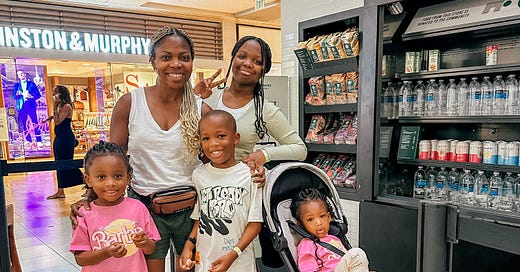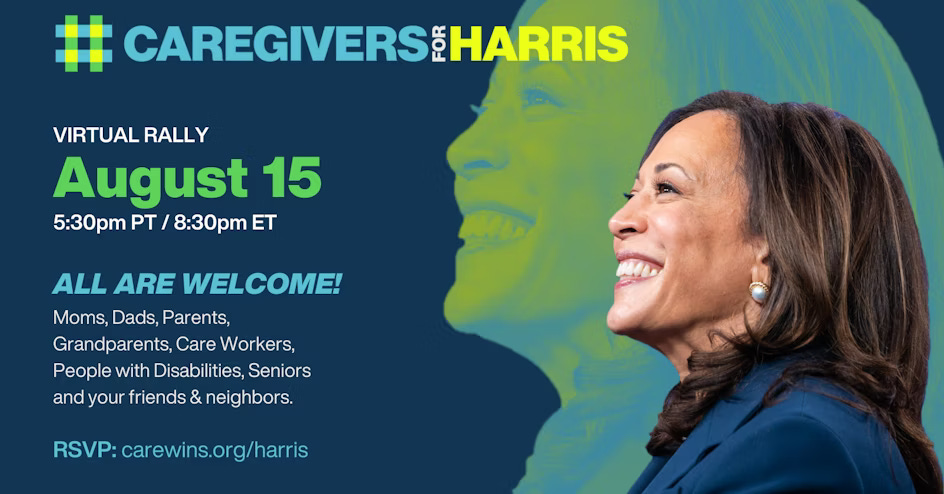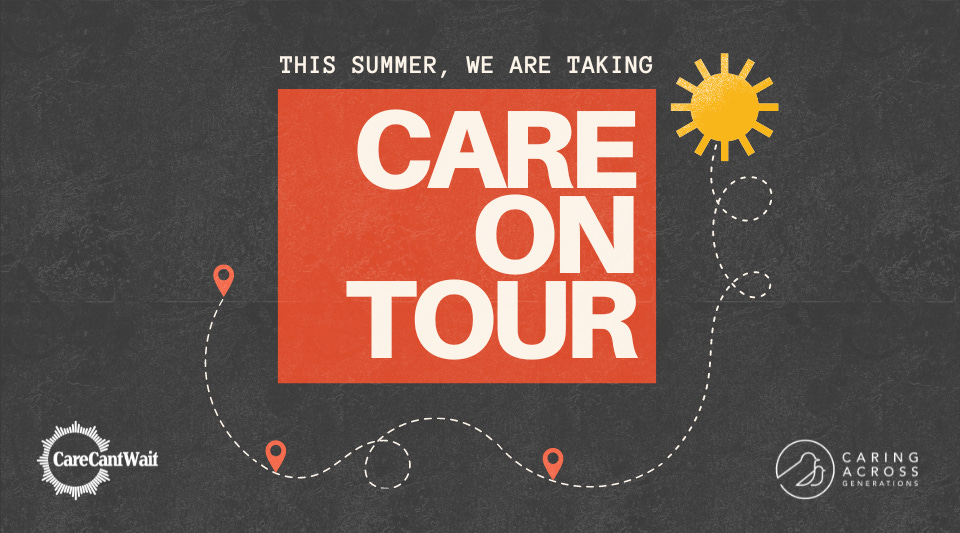Are We Shifting Our Care Burden To Marginalized Women In The Informal Economy
The Unequal Care Burden on Women and Its Impact on Economic Participation and Gender Equity
This week, The Care Gap is addressing a pivotal issue: the unequal care load on women and how it limits their participation in the formal economy, including a disturbing trend, the shifting of care from women in the formal economy to marginalized low-income women in the highly informal and unregulated economy. Perhaps its because after hosting a one-of-a-kind nanny job fair in Lagos, Nigeria last month, I realized very quickly how much work is expected of domestic workers and how little families are willing to pay? Perhaps its grappling with caring for my own four children in Houston, Texas and reminded once again how expensive formal care is in America, and how I could access cheaper care via low-income and in some cases undocumented immigrant workers? The bottomline here is that women’s work of caregiving is often undervalued, leading to economic disparities that ripple through any society. Let's discuss these themes and explore pathways to a more equitable future.
TLDR:
Undervalued Women's Work: Women's contributions in the home have historically been undervalued, despite their substantial impact on the economy.
Shift to Informal Economy: To participate in the formal economy, many women shift the care burden to the informal economy, relying on marginalized domestic workers.
Reflecting Societal Values: The lack of national policies for parental leave, low wages, and lack of protections for domestic workers highlight the devaluation of care work.
Call to Action: Systemic changes are necessary to value care work and support women's full economic participation.
Undervalued Women's Work
Economists often claim that women are not adequately represented in the formal workforce, yet women have been working since the beginning of time. The issue lies in the fact that their work is not valued appropriately. Even when women work full-time jobs, they still bear the majority of domestic responsibilities, resulting in them working more total hours in a day compared to men.
Women have always been integral to economic productivity, albeit in roles often deemed as non-economic or informal. The failure to recognize and value this labor perpetuates economic disparities. Women are typically tasked with unpaid domestic duties such as cooking, cleaning, and caregiving, which, while critical to societal functioning, are not included in traditional economic metrics.
Data Insights:
Time Investment: According to the OECD, women spend an average of 4.5 hours per day on unpaid care work, compared to 1.5 hours for men. This discrepancy leads to women working an equivalent of 85 additional days annually.
Economic Contribution: The International Labour Organization reports that unpaid care work contributes to about 9% of global GDP, predominantly performed by women. This significant contribution remains invisible in GDP calculations, masking the true extent of women’s economic involvement.
Shift to Informal Economy
To participate in the formal economy, many women have shifted the care burden to the informal economy of domestic workers. We call this ‘outsourcing’ which in a lot of cases is care work that could and should be redistributed to ‘male’ partners, but I digress. Workers who often step in to care are predominantly women with little to no formal education, often from marginalized communities such as Black, Hispanic, or immigrant backgrounds. The devaluation of care work continues, as upper middle-class or wealthy women shift their burdens to other marginalized women.
This dynamic reveals a disturbing trend: the undervaluation of care work transcends socio-economic classes, perpetuating a cycle of exploitation. Domestic workers provide essential services that enable other women to enter the workforce, yet their labor is often underpaid and unprotected.
Relevant Statistics:
Demographics of Domestic Workers: According to the National Domestic Workers Alliance, 95% of domestic workers in the U.S. are women, and more than half are women of color. These workers are typically paid low wages and lack job security.
Economic Disparities: Domestic workers earn a median wage of about $10.21 per hour, significantly lower than other household workers such as gardeners or personal drivers who are predominantly men. This wage gap highlights systemic undervaluation of predominantly female roles.
Reflecting Societal Values
The lack of value for care in society is reflected in various ways. The absence of a national maternity and paternity leave policy for new parents, low wages, and the lack of social protections for domestic workers highlight this issue. Additionally, professions where women are overrepresented, such as daycare workers, teachers, and early childhood educators, are notoriously underpaid because society expects women to care for children free of charge.
These issues are symptomatic of deeper societal norms that undervalue traditionally feminine roles. The lack of institutional support and fair compensation for care work perpetuates gender inequalities and restricts economic mobility for women.
Case in Point:
Parental Leave Policies: The U.S. is one of the few developed countries without a national paid parental leave policy, putting immense pressure on new parents, particularly mothers. This lack of support forces many women to choose between their careers and caregiving responsibilities, exacerbating the gender pay gap.
Wage Disparities: According to the Economic Policy Institute, domestic workers often lack basic labor protections, including overtime pay and health benefits, exacerbating economic vulnerabilities. This lack of protection highlights the systemic undervaluation of care work compared to other sectors.
Moving Forward
To address these disparities and support women's full economic participation, we must implement systemic changes:
Recognize and Value Care Work:
Implement policies that recognize and compensate unpaid care work.
Include caregiving responsibilities into GDP calculations.
Support Domestic Workers:
Ensure fair wages and labor protections for domestic workers, including overtime pay, health benefits, and safe working conditions. This can be achieved through legislation and enforcement of existing labor laws.
Promote legislation like the Domestic Workers Bill of Rights to provide legal protections and recognition. Legal frameworks should be strengthened to ensure that domestic workers receive the same rights and protections as other workers.
Equitable Distribution of Care:
Encourage equitable sharing of domestic responsibilities between men and women from a young age to break traditional gender roles. Educational initiatives can foster a culture of shared responsibility.
Support family-friendly workplace policies, such as flexible work hours and remote work options, to help balance work and caregiving responsibilities. Employers should be incentivized to adopt policies that accommodate the needs of caregivers.
Comprehensive Parental Leave Policies:
Advocate for national paid parental leave policies that support both maternity and paternity leave, enabling both parents to share caregiving responsibilities. This would alleviate the disproportionate burden on women and promote gender equity.
Provide incentives for companies to adopt family-friendly policies and create a supportive work environment for parents. Corporate policies should align with broader societal goals of gender equality and support for families.
The unequal care burden on women significantly limits their participation in the formal economy. By recognizing and valuing care work, supporting domestic workers, and implementing equitable policies, we can ensure that women can fully participate in the economy and that care work is respected and compensated appropriately. Moving forward, it is crucial to foster a society that values care, promotes gender equity, and supports all workers, regardless of their role or background.
By addressing these issues and implementing systemic changes, we can move towards a more equitable and caring society, ensuring that the contributions of all individuals are valued and respected.
Global Care Memo
Family Values Will Decide the 2024 Election — But Not in the Way You Think: Across party lines, Americans are united in their demand for candidates who prioritize family-friendly policies. A staggering 89 percent of voters want candidates to have a plan to help parents afford quality child care. This issue transcends party lines, reflecting a deep, bipartisan consensus. Read More.
Providing Care After Roe, These Doctors Met a Hurdle They Didn’t Expect: Online abortion providers face constant headwinds, even with protections and systems in place. Read More.
Vance agrees that raising grandchildren is ‘whole purpose of postmenopausal female,’ unearthed audio shows. Vance also seemed to agree when a podcast host suggested that having grandparents help raise children was a ‘weird, unadvertised feature of marrying an Indian woman’. Read More
Upcoming Care Events
Caregivers For Harris: Open meeting for #CaregiversForHarris on Thursday, August 15th, at 5:30 pm PT / 8:30 pm ET. All of us will give or receive care in our lifetimes. Join us on an open meeting of #CaregiversForHarris and invite all the caregivers and other care champions in your life, including: care workers, moms, dads, parents, grandparents, people with disabilities, our aging loved ones, and more (that's all of us!). The powerful leadership of Vice President Harris at the very top is needed to move our country toward being a place where every family and community can thrive as our businesses and economy are lifted. Vice President Kamala Harris has been there for us advancing policies that do just that by building our care infrastructure, including: childcare, paid family and medical leave, aging and disability care, good pay for care workers, and more. And now we’re going to show up for HER!! Catch the first #CaregiversForHarris VIRTUAL RALLY!
Hype Women For Harris: From Aug 15th - Nov 5th, Hype Women for Harris is bringing you seven virtual events -- each themed to inform, inspire and invite you to take action and do your part to help elect Kamala President. The party starts with our Hype Women for Harris Virtual Kick-Off on August 15, 2024, from 8 - 9:30 pm ET.
ParentsTogether Action: Join on Thursday, August 15th at 1:30 PM ET for an exciting virtual briefing — Persuadable Parents: Moving a Key Voting Bloc in 2024. Parents make up 1 in 5 voters in this election and they are more persuadable and respond more favorably to Democratic messaging compared to non-parents. Our research shows that Democrats have lost parents’ support in recent years – but we have a clear path to win them back. ParentsTogether Action has built an innovative strategy and newly tested digital ads that are moving parents’ vote choice ahead of this year’s election. In this briefing we will share key new insights from a survey of our parent audience, lay out ParentsTogether Action’s plans to implement this strategy in key battleground states, provide an exclusive preview of our soon-to-be-released ads, and share what’s working to mobilize parents and secure wins up and down the ballot.
Care On Tour: is a national campaign committed to highlighting the importance of affordable, accessible care across the United States through powerful storytelling, community engagement, and policy advocacy. From aging and disability care, to child care and paid leave, our nation is in dire need of policies, programs, and a culture that gives us the support we need to care for the people we love. Through a series of multi-city events and performances, we're sharing diverse stories that all share one truth: everyone deserves care. Together, we can amplify the call for care reform and explore pathways for actionable change.
Closing The Care Gap At Work
This month, we are at Indeed and Deloitte, closing the care gap for their caregiving workforce. I am biased towards companies who prioritize not only the wellbeing of their employees, but are also considerate of the care load they shoulder as they support their children, aging parents, persons with disabilities and more. If your organization needs support in the coming weeks or months especially ahead of October which is National Work and Family Month, and November which is National Caregivers Month, feel free to schedule some time with myself and my team here.
The Care Gap is written by Blessing Adesiyan, Founder & CEO of Mother Honestly Group Inc., the parent company for The Care Gap, Caring Africa, and Caring Blocks where she is on a mission to close the care gap for families, workplaces, and economies globally through content, advocacy, and technology. Follow @blessing.adesiyan @thecaregap for more.









This is so informative and so well said, thank you! I didn't know about Caregivers for Harris but would love to attend the next virtual rally. Do you know when it will be?